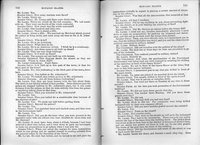742-743
| Previous Page | Next Page |

|
Mr. Laird. Yes.
Senator Gray. How many marines were there?
Mr. Laird. Thirty-six.
Senator Gray. Mr. Young said there were thirty-two.
Mr. Laird. Thirty-six would be the full company. We had music with us. They were one-fourth of the whole command.
Senator Gray. How much was the whole command?
Mr. Laird. One hundred and sixty-two.
Senator Gray. That is about a fifth.
Mr. Laird. About a fifth. We marched up Merchant street, passed the palace at King street, and went away out here to Mr. J. B. Atherton's.
Senator Gray. Who is he?
Mr. Laird. He is an American.
Senator Gray. What does he do.
Mr. Laird. He is an American citizen. I think he is a missionary.
Senator Gray. Are these squares all built up there?
Mr. Laird. They are very large holdings.
Senator Gray. Is it built up there?
Mr. Laird. The squares are not built up with houses.
Senator Sherman. This diagram shows the streets as they are improved. Where is Arion Hall?
Mr. Laird [indicating]. Right there.
Senator Gray. Is it built up in this part of the town; is that the thick part of the town?
Mr. Laird. No; this [indicating] is the thick part of the town, down here.
Senator Gray. You halted at Mr. Atherton's?
Mr. Laird. We halted once before getting to Mr. Atherton's.
Senator Sherman. Are all these houses [indicating]?
Mr. Laird. Yes; they are large houses, with the lots about them. The town is not thickly settled in that portion. Some distance past the palace we stopped halfway to Mr. Atherton's place, but it was some distance from the palace, so that we were entirely free from the palace or anything taking place at that time.
Senator Gray. Then you marched to Mr. Atherton's?
Mr. Laird. Yes.
Senator Gray. Then you halted for a considerable time because of the showers of rain?
Mr. Laird. Yes. We made one halt before getting there.
Senator Gray. Beyond the palace?
Mr. Laird. Yes.
Senator Gray. You marched there and stacked arms, and then went to the Government hall?
Mr. Laird. Yes.
Senator Gray. Did you fix the hour when you were present in the captain's cabin with the officers who were detailed for shore duty and Mr. Stevens?
Mr. Laird. It must have been about 4 o'clock, because I had been relieved a short time before, and I went down to pack my haversack, to make my preparations to go ashore when I was sent for.
Senator Gray. When you asked the captain for some instructions which he was giving you he applied himself to reading extracts from the general orders by the Secretary of the Navy?
Mr. Laird. He read that before, and he turned to me and gave the
|
instructions verbally in regard to placing a certain amount of discretion on his officers.
Senator Gray. Was that all the conversation that occurred at that time?
Mr. Laird. All that I recollect.
Senator Gray. Did he say anything to you about preventing fighting in the streets, or in your hearing say anything of that?
Mr. Laird. No.
Senator Gray. Did Mr. Stevens go ashore before the troops did?
Mr. Laird. I could not say, because immediately afterward I went down to make my preparations for packing my knapsack and haversack, and did not go on deck until the troops were formed.
Senator Gray. Then, you have already said, or I understood you to say, that the military discipline was strict, and you and the other officers confined yourselves to military duties?
Mr. Laird. Military duties.
The Chairman. Did not interfere with the politics of the place?
Mr. Laird. The first two or three days we were not permitted to go out of the inclosure.
The Chairman. You confined yourself to military duties?
Mr. Laird. Entirely so.
The Chairman. And when the proclamation of the Provisional Government was being read you were engaged in assisting the drilling of the battalion in front of the Opera House?
Mr. Laird. No, not in front of the Opera House at the time; they were in this little narrow inclosure.
Senator Gray. I understood you to say that you drilled in front of the opera house.
Mr. Laird. No, some one asked if we marched down the street.
Senator Gray. You usually drilled in front of the opera house?
Mr. Laird. That was in parade or battalion drills.
Senator Gray. You were not there on Tuesday at any time in dress parade?
Senator Frye. At the time you took possession of the Government building?
Mr. Laird. We did not have dress parade that day.
Senator Gray. You landed there Monday. Did you have dress parade next day?
Mr. Laird. We did not.
Senator Gray. The only drill you had was that?
Mr. Laird. Back in this lot. The companies were being drilled independently by their own company officers.
Senator Gray. Did you have sentries posted around the outside?
Mr. Laird. Yes.
Senator Gray. Posts on the street?
Mr. Laird. Had regular posts.
Senator Gray. They were on the streets as well as in the inclosure?
Mr. Laird. They had to be, necessarily. There was only one sentry outside the line of the fence from the building itself. The picket fence was about as far as from here to the window [a distance of about 8 feet], and one sentry was posted out there to look out for our own people. The limits of his post were the front of the building.
Senator Gray. Did the Government hall touch on the street, or was it back inside the fence?
Mr. Laird. Inside the fence, and fronted a small alley-way. Here
| Previous Page | Next Page |